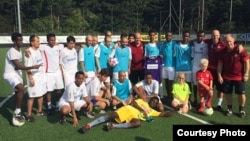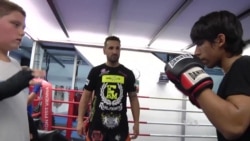With 85,000 people expected to claim asylum in Austria this year, the government has declared integration a key issue. The number of German classes, vocational training and work subsidies is being increased, but it does not end there.
As in the past, part of the answer to successful integration, Austria believes, lies on thousands of pitches, fields, courts and treks. With a great love of sports, the local population centers much of its social life around the clubs they are part of or support. That, the government believes, is a way to dismantle fear of contact and help asylum-seekers find a place in society.
“The relevance of sport as a factor for integration of socially disadvantaged groups cannot be underestimated. It is a major historic quality of sport,” said Ilan Fellmann, a senior advisor for the Ministry of Sport.
Famous clubs, especially in soccer, are trying to become role models. Every Friday, Austria Vienna, one of the most popular and successful teams in football-crazy Austria, holds training camps for 20 to 30 young, unaccompanied migrants.
For an hour, the teenagers gather on the pitch and exercise with professionals of the more than 100-year-old club.
With the team
Head of communications Christoph Pflug said it is vital the club showed its hundreds of thousands of fans what social responsibility meant.
“We see this not just as an opportunity to give something back to our environment, but we also see it as our duty to do this and to live up to our function as a role model,” Pflug said. More than 50 percent of the club's players and coaches have a migration background.
The program “We are part of it” has given other sport clubs and individuals the opportunity to offer additional language courses, cultural exchanges and leisure activities to refugees.
The main aim is to connect local Austrians with newly arrived refugees. Sport is one of the best ways to further integration because people already share the same interest and start working towards a common goal, said Shanti D'Sa from the Austrian Integration Fund.
“Especially in sport, the motivation of children and grown-ups to get to know each other is very big,” she said.
Soccer is one of the most popular activities offered, but American football, rugby, cycling and sailing are also available.
In the ring
So is kickboxing. On a recent afternoon at a boxing club in Vienna, teenagers from Ethiopia, Afghanistan, Syria and Austria trained with Fadi Merza, a Syrian-born Austrian who won several world champion titles in Muay Thai boxing.
When Merza first arrived in Vienna at the age of 12, he found it hard to fit in. Eventually, though, the boxing gym became his second-home, and a place of refuge where only his performance mattered, he said.
“Your skin color or your nationality, nobody cares about that in the gym. You just work together,” he said.
Two Austrian kids, 13-year-old Sefko and 12-year-old Jeremy, enjoyed the training.
“They were training with us today, but it was the same as always, just that maybe we were going a bit faster than usual,” Sefko said.
“They are just like us. People are people,” Jeremy added.
When Merza started kickboxing, he was 16, the same age as Sadiq, a refugee from Afghanistan who arrived in Vienna several months ago. After an hour of hard training, Sadiq beamed when Merza told him that he had a rare talent, and that he could be a champ if he continued training.
It wouldn't be the first time a former refugee made it to the top of Austrian sports.
On the pitch
About half the players on Austria's national soccer team have a migration background.
“The current issue concerning refugees has not failed to leave its mark on the players of the National Team. We, too, have some players with migration background, and some of the parents of our players have come to Austria as asylum seekers,” the team said in a statement.
During the last soccer world championships, EU qualifying teams had 22 percent of their players with a migration background.
“Particularly in football, the symbolic representation of diversity and inclusion can be seen in the lineups of many top clubs and national teams,” said Kurt Wachter, from the Vienna Institute for International Dialogue and Cooperation.
“Look how good they are,” a Ministry of Interior official recently said as she passed a group of boys playing soccer at an emergency refugee camp outside Vienna.
“I wouldn't be surprised if some of them will play in our national team one day,” she said.






